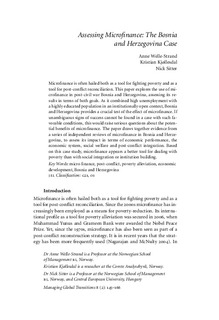Assessing microfinance: The Bosnia and Herzegovina case
Journal article, Peer reviewed
Permanent lenke
http://hdl.handle.net/11250/93334Utgivelsesdato
2010Metadata
Vis full innførselSamlinger
- Scientific articles [2181]
Originalversjon
Managing Global Transitions, Vol. 8, No. 2 (2010), p. 145-166.Sammendrag
Microfinance is often hailed both as a tool for fighting poverty and as a tool for post-conflict reconciliation. This paper explores the use of microfinance in post-civil war Bosnia and Herzegovina, assessing its results in terms of both goals. As it combined high unemployment With a highly educated population in an institutionally open context, Bosnia and Herzegovina provides a crucial test of the effect of microfinance. If nambiguous signs of success cannot be found in a case with such favorable conditions, this would raise serious questions about the potential benefits of microfinance. The paper draws together evidence from a series of independent reviews of microfinance in Bosnia and Herzegovina, to assess its impact in terms of economic performance, the economic system, social welfare and post-conflict integration. Based on this case study, microfinance appears a better tool for dealing With poverty than with social integration or institution building.
Beskrivelse
Utgiver-policy: Åpen tilgang / Open Access
